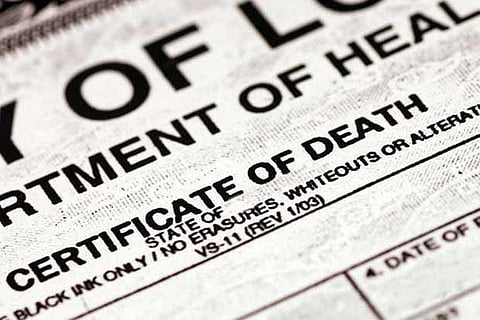

Chennai
According to the report on ‘Medical Certification of Cause of Death — 2014 (MCCD)’, Tamil Nadu retained the 15th rank, among 33 states, behind other major states including Maharashtra and Karnataka.
If health officials in the State are looking at streamlining their public health programmes going by the death registration, they are going to have a tough time as the percentage of medical certification of death is just a little over 30 per cent in the state. According to the latest report on MCCD, out of the 5,47,579 registered deaths during 2014, just about 1,84,875 were medically certified. MCCD is considered crucial for obtaining reliable cause-specific mortality statistics, which is crucial to administrators, policy planners, researchers etc., for evidence-based decision-making regarding resource allocation, monitoring of indicators, identifying the priorities for health programmes and other related activities in public health. However, experts claim that there are enough provisions to certify the cause in as many as 70 per cent of the deaths.
Dr K Kolandasamy, Director, Public Health and Preventive Medicine, while admitting that 33.8 per cent was considerably low, added that Tamil Nadu had the potential to take the percentage up to 70 per cent, as the registration of births and deaths is 100 per cent. “The problem lies in the faulty implementation by some. There are some who merely list the cause of death as old age without specifying the exact cause. We have been training several practitioners, as part of the national programme, to accurately certify the cause of death,” he says. He adds that the exact cause of death is important as it indicates the extent of success of public health programmes.
“Cause-specific data would provide a clearer indication of any shifting pattern. Currently, we are researching non-communicable diseases. A comprehensive data on hypertension and diabetes related deaths would help determine the programme we need to implement and its effective execution,” he adds. Private practitioners also claim that adequate procedures are being followed. Dr R Kannaiyan, General Physician, adds that even for deaths taking place at homes, an elaborate procedure is followed. “When the deceased’s family contacts us, we tell them to either bring the body to the hospital or we insist on sending an ambulance,” he insists.
Limited cover
The MCCD under Civil Registration System was implemented in the states/union territories to provide data on the cause of death. However, it has only been implemented in certain hospitals, generally in urban areas which are selected by the Chief Registrar of Births and Deaths. Thus, the scheme covers mostly those deaths, which occur in medical institutions located in urban areas. Some of the states have notified only teaching and specialised hospitals under it, whereas in others, only district hospitals and Primary Health Centres are under its ambit.
Visit news.dtnext.in to explore our interactive epaper!
Download the DT Next app for more exciting features!
Click here for iOS
Click here for Android